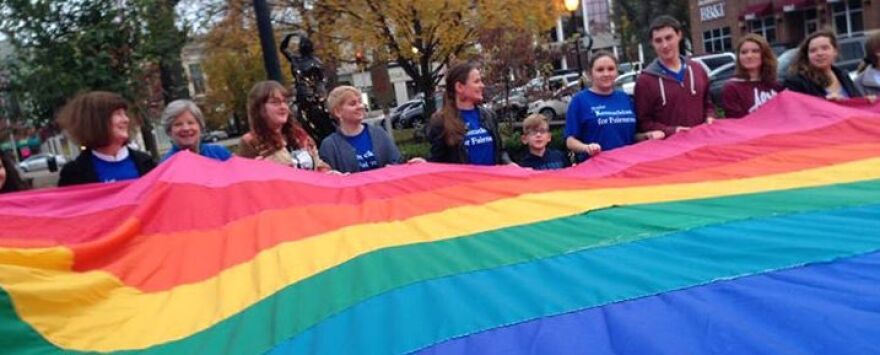Update: The effort to pass a fairness ordinance failed to receive a vote at Tuesday's Bowling Green City Commission. You can read about that here.
Original post:
When the Bowling Green City Commission meets Tuesday, it will be a historic moment for members of the LGBT community.
For the first time, a fairness ordinance will be on the agenda that would make it illegal to discriminate against someone because of their gender identity and sexual orientation.
Members of the local LGBT community and supporters have spent years making speeches, delivering petitions, and holding rallies in support of extending civil rights protections to individuals based on their gender identity and sexual orientation. Commissioner Slim Nash is fulfilling a campaign promise by introducing the ordinance.
“I have come to believe whole-heartedly that there is a problem," Nash told WKU Public Radio. "I’ve met many people who are willing to share their story with me, but who are reluctant to share their story with the larger public out of fear.”
Nash’s proposal before the Bowling Green City Commission would add lesbians, gays, bisexuals, and transgender individuals to the city's current law that prohibits discrimination based on race, religion, age, color, and nationality.
The proposed ordinance would ban discrimination against the LGBT community in areas such as employment, housing, and public accommodations. The measure includes an exemption for religious institutions.
“Communities are only as good as the protection they offer, and this community is too good not to offer equal rights to all of its people," said Patti Minter, a member of the local fairness coalition.
As a history professor at Western Kentucky University, Dr. Minter draws a comparison to the civil rights movement of the 1950s and 60s.
“If you were not part of a group suffering discrimination, maybe the discrimination wasn’t invisible to you, but many people didn’t think it was wrong, and it took a grassroots civil rights movement in the United States, and in Kentucky, to show that it was wrong," explained Minter. "Now, I can’t imagine any reasonable person arguing that the Civil Rights Act of 1964 at the federal level was not necessary.”
The LGBT community says discrimination is occurring in Bowling Green. Dr. Grayson Hunt teaches philosophy at WKU. As transgender, he doesn’t like talking about his personal experiences, but says discrimination is very real.
“A couple of gender non-conforming students of mine were recently turned away from a barber shop," Hunt commented. "The barber said he was only going to cut “men’s” hair, and the students were kicked out for that reason, which is certainly gender discrimination, if not also on the basis of gender identity and sexual orientation.”

The Bowling Green Human Rights Commission occasionally gets complaints, but those cases aren’t recorded since there isn’t a law protecting the LGBT community. Dr. Patti Minter says having no legal remedy forces most LGBT members to suffer silently.
“There are no legal protections for them. They can’t sue. There is no legal route you can take if you’ve been discriminated against," Minter stated. "If you’ve already suffered discrimination once, maybe you’ve gotten another job or found some place to live. Maybe you don’t want to go through that trauma again.”
For supporters, getting an ordinance on the city commission agenda is a major feat. Getting a vote on it will be an even bigger one. In a statement to WKU Public Radio, Mayor Bruce Wilkerson said the issue should be decided by state or federal government. The other commissioners did not respond to requests for comment. Commissioner Slim Nash appears to be the lone supporter of the ordinance.
“I’ve not heard anybody that I serve with say this kind of discrimination is not occurring," Nash said. "What I’ve heard them say is that somebody else needs to deal with it. But all I can tell you is that I was elected by the citizens of Bowling Green to represent the city, and so despite the fact that our state and federal legislatures may not acting should not prohibit or discourage the Bowling Green City Commission from acting to protect citizens who live or work here.”
It’s unlikely the measure will pass, and even discussion is no guarantee. But as Nash sees it, no action on Tuesday is only kicking the can down the road.
“The issue is not going away regardless of what the vote is on Tuesday," replied Nash.
Bowling Green is the largest city in Kentucky without a fairness ordinance protecting citizens based on their gender identity and sexual orientation. Louisville and Lexington enacted their measures more than a decade ago.







